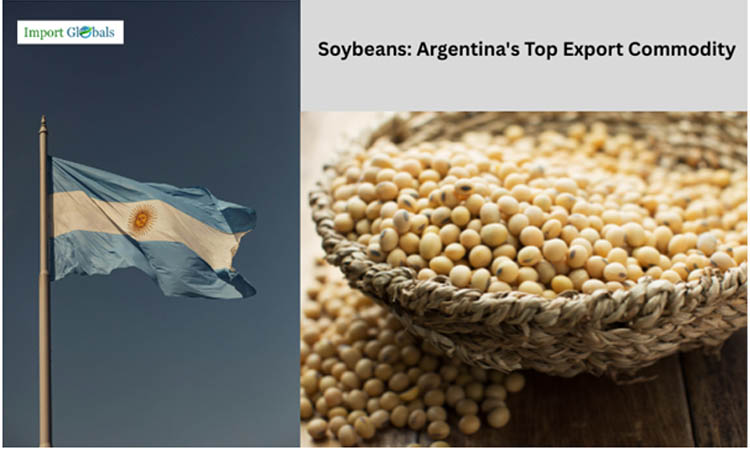
- Jun 21, 2025
Comprehensive Study About Soybeans, Argentina's Top Export Commodity
Argentina is one of the biggest producers of agricultural products in the world, and the export of these goods is a major part of its economy. According to the Argentina Export Data, soybeans are by far the most important product of all. Because they provide a range of products like soy oil, soymeal, and soy protein, soybeans are essential for domestic and international markets. By offering data from 2020 to 2024 and examining its economic significance, trade trends, strategic ramifications, and projections for 2025, this blog seeks to provide a thorough analysis of Argentina's soybean export industry.
To comprehend why soybeans are so essential to Argentina's economy and reputation worldwide, we will also look at the effects of soybean growing on the environment, production technology developments, and pricing patterns.
The Total Export Performance of Argentina
Argentina is a major agricultural powerhouse, and the state of the economy is greatly influenced by its exports. Argentina's agricultural exports, particularly soybeans, which make up a significant amount of its overall export value, are the key drivers of the country's trade surplus and robust GDP growth rate, as shown in Argentina Import Data. The economy's foundation is still the agricultural sector, which creates jobs and foreign exchange earnings. An overview of Argentina's entire import and export performance is shown below, along with important economic indicators:
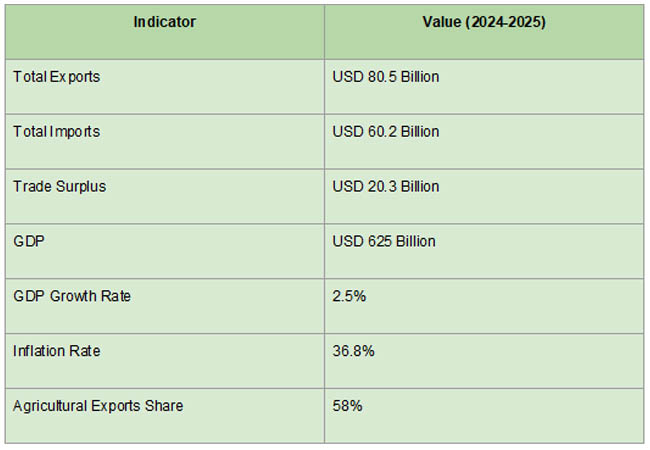
Overview of the Top Export Product: Soybeans
Glycine max, the scientific name for soybeans, is Argentina's most important export and the main engine of its agricultural export economy. According to Import Globals' Argentina Import Export Trade Data, soybeans are one of the most valuable commodities in the world due to their versatility in being used for food items, animal feed, and oil production.
Key Takeaways about Argentina's Soybeans
- Leading Export Goods: About 30% of Argentina's overall export earnings come from soybeans and their derivatives, such as soybean oil and soy meal.
- Planting Area: Argentina is the world's third-largest producer of soybeans, with around 18 million hectares dedicated to soybean cultivation, according to Argentina Import Custom Data.
- Global Rank: With significant shares in worldwide exports, Argentina ranks third in terms of soybean exports, behind the US and Brazil.
The Soybean HS Code
Soybeans (HS Code: 1201), broken or not
Argentina Import Trade Analysis, a Report by Import Globals, states that this code applies to both raw and minimally processed soybeans (such as cracked soybeans). Argentina's economy also benefits greatly from the export of processed derivatives, particularly soybean oil (HS 1507) and soybean meal (HS 2304).
Data on Soybean Exports (2020–2024)
Despite variations brought on by the climate and demand from around the world, Argentina's soybean export numbers have remained consistent. Data on Argentina's soybean exports from 2020 to 2024, broken down by USD billion, is shown below. The steady rise in soybean exports in recent years, according to Import Globals on Argentina Export Data, demonstrates the strong demand for this product around the world. Market dynamics, including demand in China, India, and the European Union, have kept Argentina's soybean export sector strong despite changes in demand throughout the world.
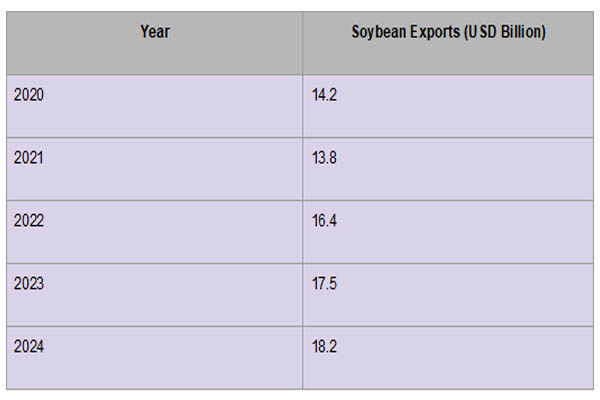
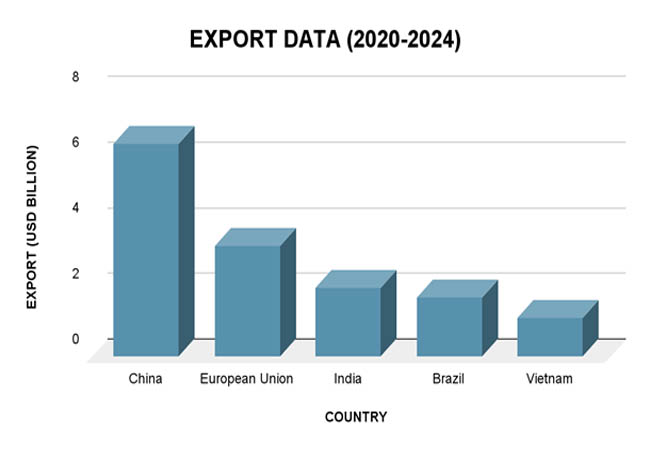
Argentina's Economic Dependency on Soybeans
Argentina's economy depends heavily on soybeans for several reasons.
Export Revenue Contribution
According to Import Globals' Argentina Import Data, almost 30% of Argentina's total export value is made up of soybeans. Argentina's export earnings, which amount to billions of dollars every year, are bolstered by the huge demand for soybeans in both their raw and processed forms.
Employment Generation
Millions of jobs are generated by Argentina's soybean sector, both directly through cultivation and indirectly through exporting, processing, and transportation. Soybean production is especially important to the livelihoods of both large and small farmers in the central Argentine pampas.
Reserves of Foreign Exchange
Argentina receives vital foreign money from the sale of soybeans, which enables it to fulfill its international financial commitments, including paying off foreign debt and funding imports.
The Surplus in Trade
As the value of exports continuously exceeds that of imports, the soybean export industry guarantees Argentina maintains a trade surplus, per a report by Import Globals on Argentina Import Trade Statistics. The nation's economy depends on this surplus since it allows the government to handle budgetary issues and settle foreign debt.
The Strategic Value of Soybeans in International Trade
With significant ramifications for both domestic and foreign trade, Argentina is an essential link in the global soybean supply chain. Here's how:
Demand for Soybeans Worldwide
Soybeans are becoming more significant in international markets as the need for plant-based proteins, animal feed, and biofuels rises. According to Import Globals' Argentina Import Shipment Data, Argentina's enormous production capacity enables it to supply important markets, especially China, the world's biggest importer of soybeans.
Agreements on Bilateral Trade
Trade agreements like the Mercosur trade group, which grants preferential access to European markets, strengthen Argentina's strategic position in the world's soybean trade.
Worldwide Supply Chain Hazards
Argentina depends heavily on favorable weather, thus, any negative consequences from droughts or other climatic catastrophes might have a significant impact on the world's supply of soybeans. Argentina is therefore susceptible to changes in the market and possible interruptions in supply.
Sustainability of the Environment
Argentina is investing in sustainable agricultural methods and technologies that enable more effective land use and less environmental harm in response to growing concerns about deforestation and sustainability in soybean production. According to Import Globals' Argentina Import Export Trade Analysis, Argentina is progressively embracing precision agriculture with an emphasis on lowering the carbon footprint of its agricultural sector.
Principal Export Markets for Argentina's Soybeans
China is the main buyer of Argentina's soybeans, which are sent to many important countries worldwide. The top locations for Argentine soybeans are listed below:
China continues to be the biggest buyer of Argentine soybeans due to rising demand for oil extraction and animal feed. According to Import Globals' Argentina Export Import Global Trade Data, India and the European Union follow suit because both countries have significant investments in cattle production and plant-based food alternatives.
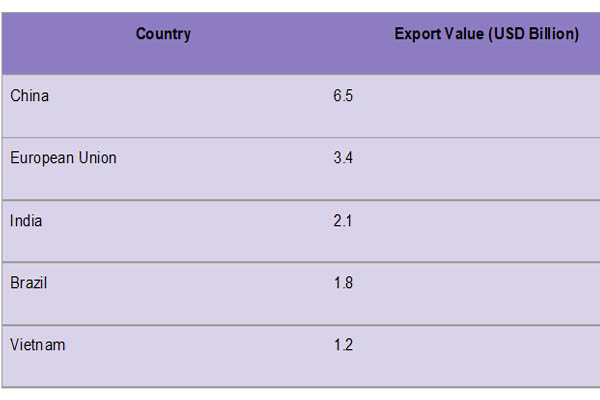
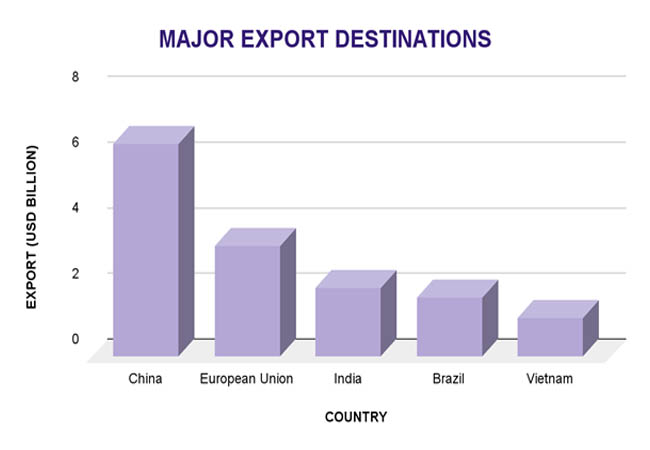
Top Soybean Exporters in the World
Although Argentina is one of the world's top exporters of soybeans, Brazil and the United States are its main rivals. According to Import Globals' Argentina Import Export Global Data, Argentina's advantageous geographic location, robust infrastructure, and solid trade ties guarantee that it will continue to be one of the world's top exporters of soybeans despite competition.
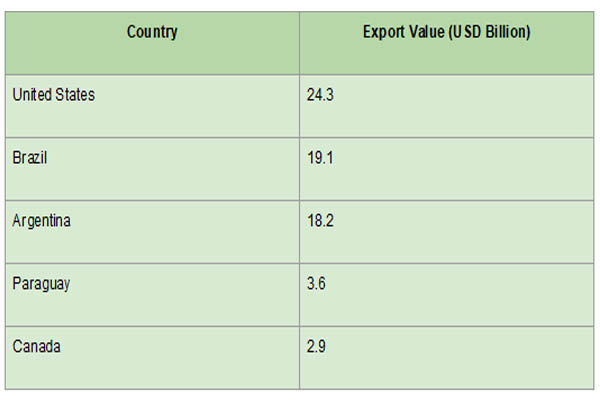
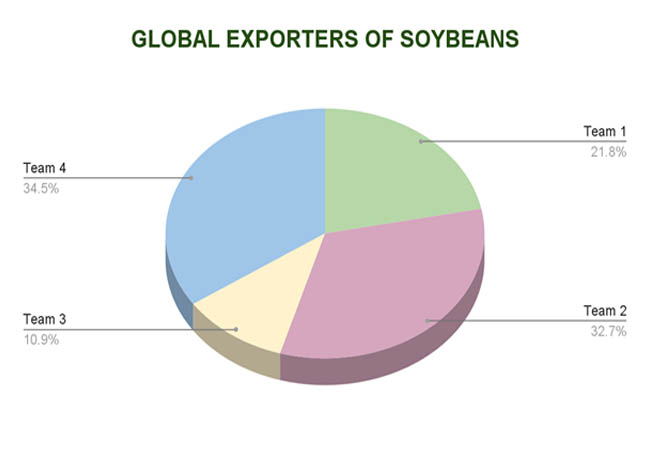
Technological Advancements in the Production of Soybeans
Technological developments have greatly benefited Argentina's soybean business by raising output, increasing efficiency, and improving sustainability. Among the major innovations are:
1. Accurate Farming
Argentine farmers can keep an eye on crop health, weather patterns, and soil conditions by using drones and GPS technology. By optimizing fertilizer and water use, this method lowers expenses and lessens its negative effects on the environment.
2. Crops that have been Genetically Modified (GM)
According to Import Globals' Argentina Import Data, Argentina has led the way in the adoption of genetically modified soybeans, especially Roundup Ready soybeans, which are pest and herbicide-resistant. Higher yields and more effective farming methods are made possible by this technology.
3. Sustainable Agriculture Methods
Crop rotation, no-till farming, and the use of organic fertilizers are innovations that improve the long-term sustainability of soybean production and reduce soil deterioration.
Soybean Export Forecast for 2025
Argentina's soybean exports are anticipated to expand steadily through 2025 as a result of rising demand for plant-based protein, animal feed, and biofuels worldwide. According to Import Globals' Research on Argentina Export Data, Argentina's soybean exports are expected to expand at a rate of 4% annually, reaching a total of about USD 19.2 billion by 2025.
Important Elements Affecting the Growth of Soybean Exports
Demand for Plant-Based Protein Worldwide: The demand for soybeans is predicted to continue to be high worldwide, especially in North America and Europe, as plant-based diets gain popularity.
Livestock Feed: Argentine soybeans will continue to be in demand due to the expanding demand for animal feed in developing countries, particularly China and India.
Environmental Rules: As environmental consciousness grows, stricter rules may be implemented, which would increase demand for sustainable soybeans and open doors for Argentina's more ecologically conscious growers.
Price Patterns and Market Unpredictability
Climate, market speculation, and the worldwide supply-demand balance are some of the many variables that affect soybean prices. Soybean prices are expected to fluctuate between USD 470 and USD 520 per metric ton in 2024, driven by meteorological events, changing demand, and geopolitical considerations, according to Import Globals' Argentina Export Data.
The following Factors affect Soybean Prices
Weather: Price increases may result from floods or droughts in key producing nations.
Government Policies: International trade flows and prices may be impacted by trade tariffs and subsidies.
Changes in exchange rates can either make Argentine soybeans more competitive or more expensive on the global market because soybeans are traded in US dollars worldwide.
In conclusion
Unquestionably, the mainstay of Argentina's export-based economy is soybeans. Argentina is well-positioned to continue being a leading worldwide exporter of soybeans due to its consistent export growth, technological developments, and robust demand from international markets, according to Argentina Import Export Trade Data. However, the industry must contend with market volatility, environmental issues, and competition from other countries that produce soybeans. Argentina will need to keep developing sustainable farming methods, making technological investments, and adjusting to shifts in the global market if it is to hold onto and improve its position.
If you are looking for detailed and up-to-date Argentina Export Data, You Can Contact Import Globals.
FAQs
Que. Why are soybeans the most popular export from Argentina?
Ans. About 30% of Argentina's total export earnings come from soybeans, which are in high demand worldwide for use in food, feed, and biofuel.
Que. How many soybeans does Argentina export each year?
Ans. Argentina's soybean exports are estimated to be worth USD 18.2 billion in 2024.
Que. Which nations purchase the most Argentine soybeans?
Ans. India, the European Union, and China are the biggest importers.
Que. What environmental issues does Argentina's soybean industry face?
Ans. The main issues include pesticide use, water use, and deforestation, all of which can have long-term ecological effects.
Que. Where to obtain detailed Argentina Export Data?
Ans. Visit www.importglobals.com or email info@importglobals.com for more information on up-to-date Argentina Export Data.
